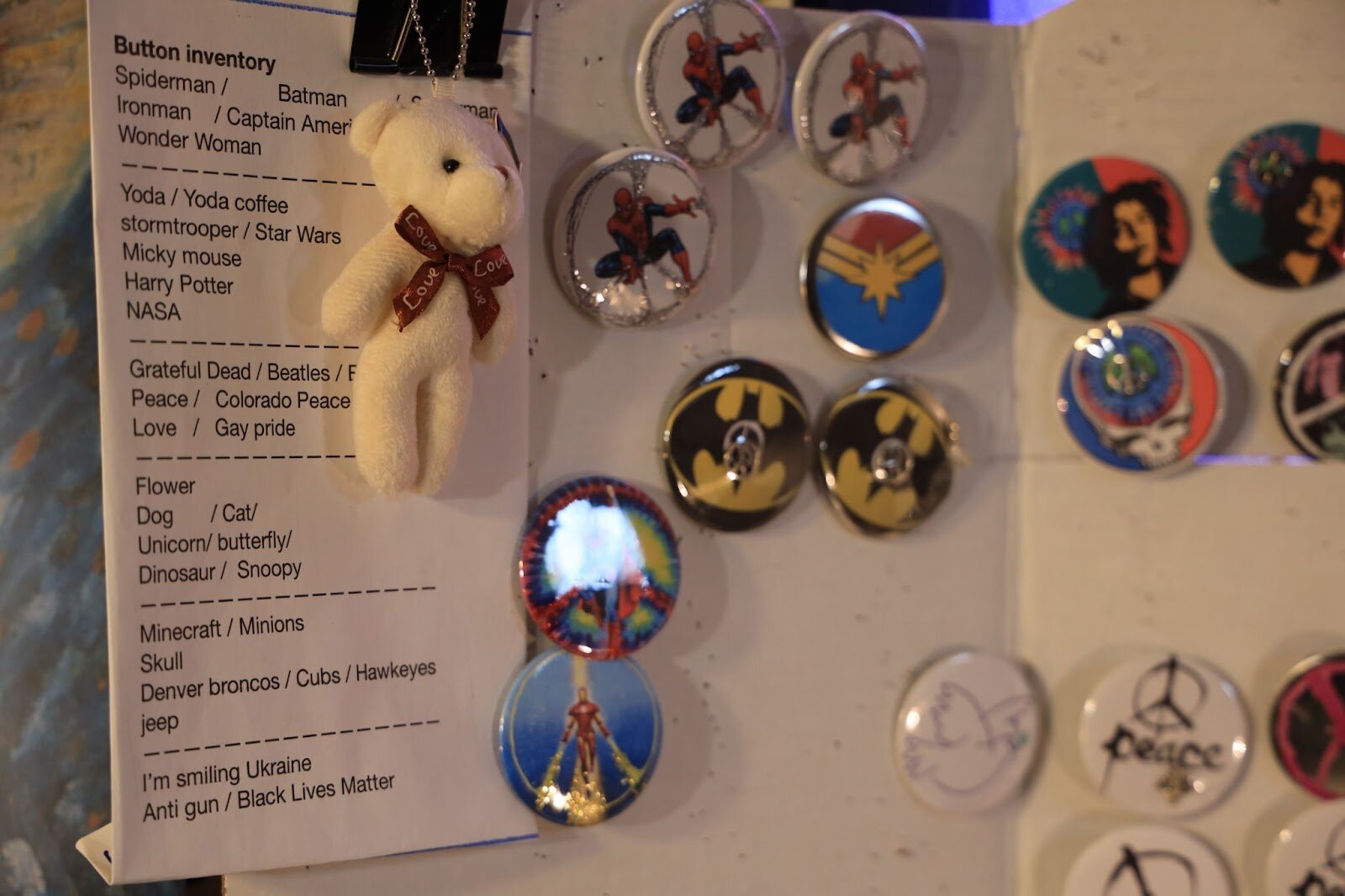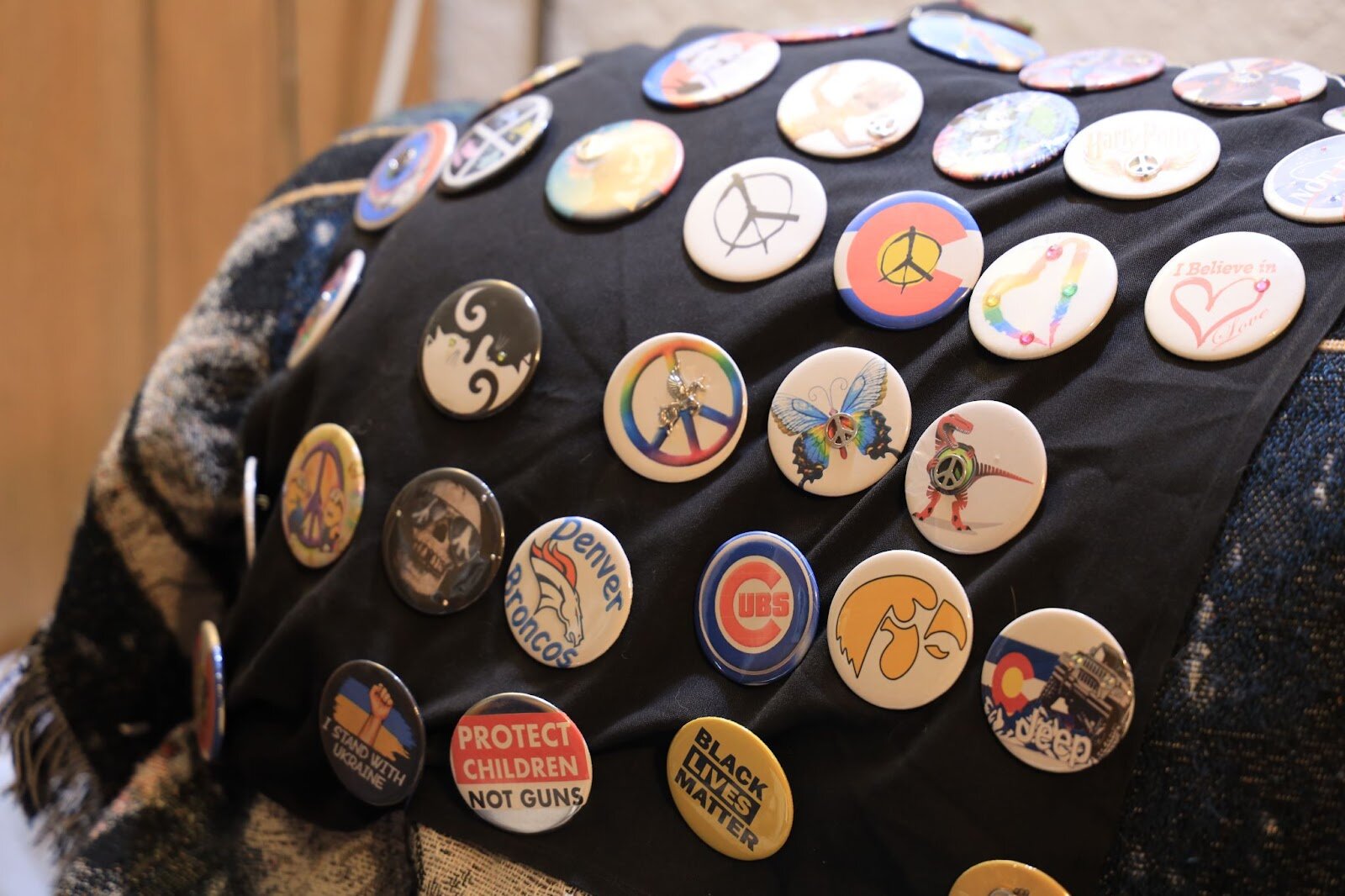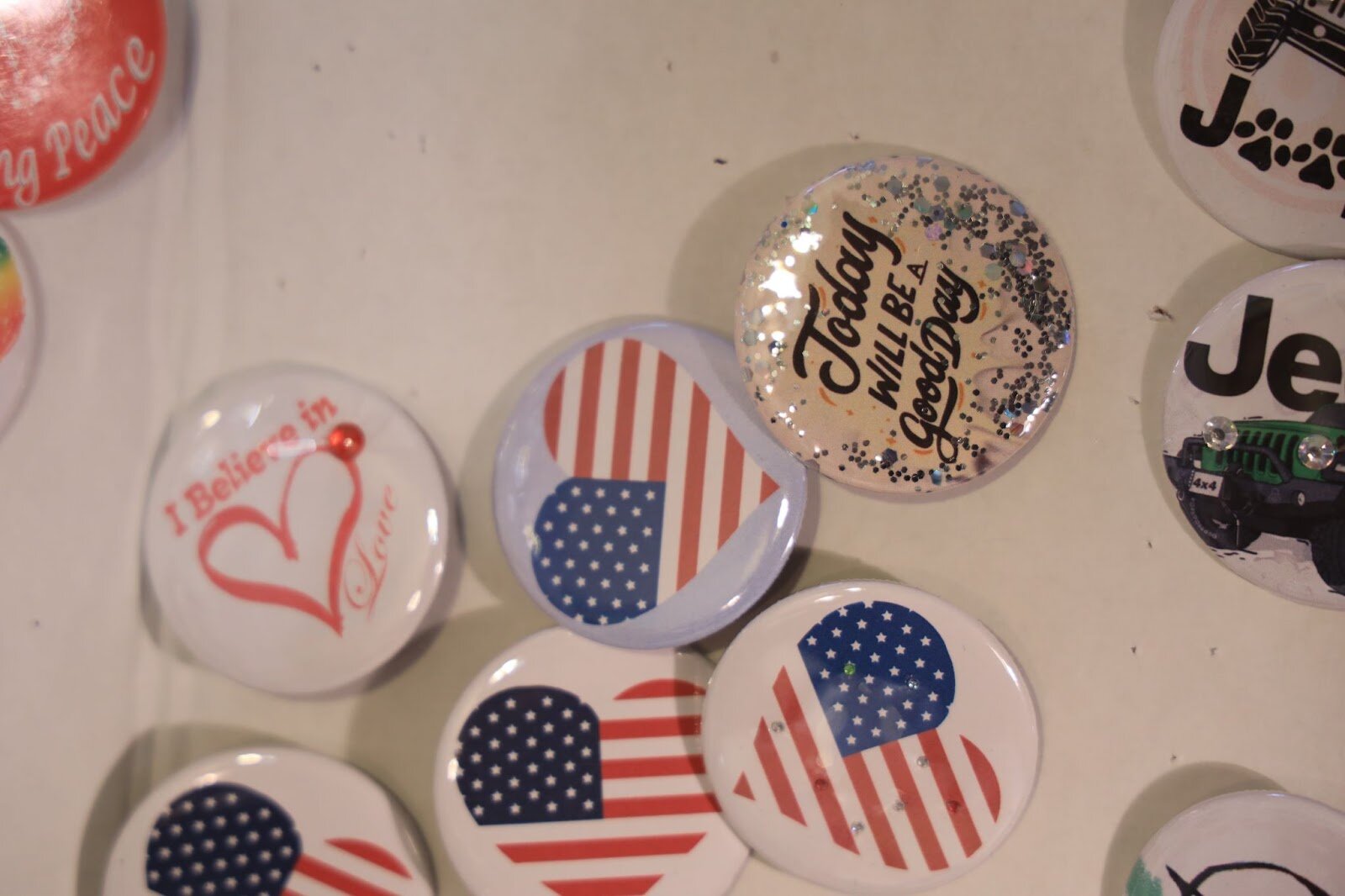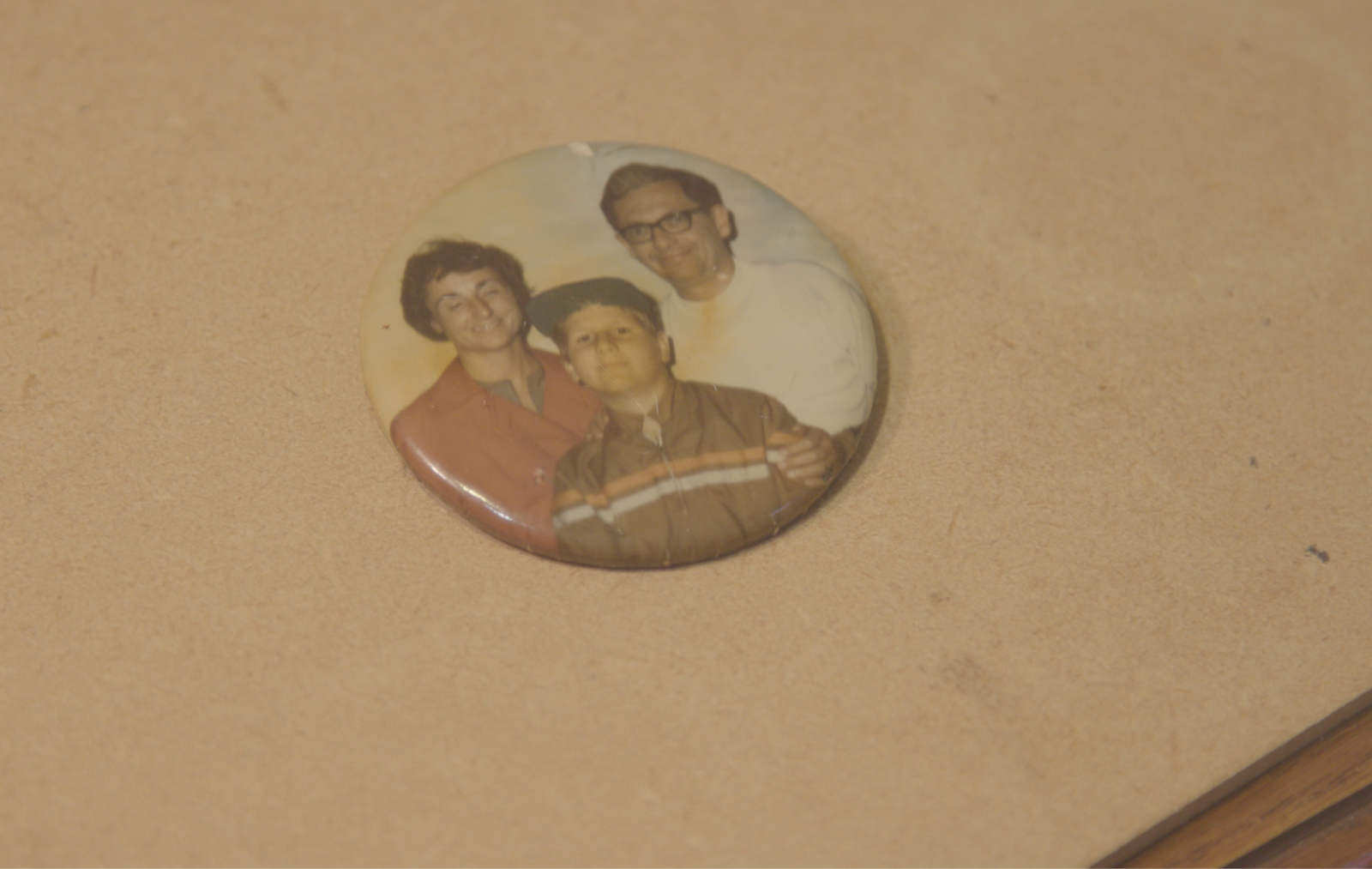Do you know the Button Man?

COLORADO SPRINGS, Colo. — Do you know the Button Man?
Tom Howes, known to many in Colorado Springs as the Button Man, first started creating buttons as a teacher at Broadmoor Elementary School following the Columbine High School shooting as a way to make every child feel seen.
The buttons he made back then featured each student’s name so they could become familiar and connected with one another.
Now retired from teaching, Howes continues to design, produce and distribute more than 8,000 buttons a year across Colorado Springs and beyond.
Howes sat down with Rocky Mountain PBS to discuss what makes the homemade, clip-on button maker so fasten-ating.
Rocky Mountain PBS: Can you provide some background into who you are outside of the Button Man?
Tom Howes: Sure. I’m Tom Howes, I’ve been here in Colorado Springs since 1976. School teacher, now mostly retired, and now a part-time tour guide in jeeps up to the top of Pikes Peak and through Garden of the Gods. So my job is my hobby, but I have another hobby that takes me almost as much time as my job, and that’s making buttons.
RMPBS: How do you decide which buttons to make?
TH: You know, you never know what the next button is going to be… because something will pop-up on the news, or become the new thing, or sadly another tragedy, another mass shooting. You’re always creating new buttons, and that’s part of what I love: being on the computer, doing the graphic design, that’s a lot of fun.

Howes has boards full of home-made, self-designed buttons.
Photo: Chase McCleary, Rocky Mountain PBS
RMPBS: How do you decide who should get a button?
TH: Oh, [my wife and I] give buttons to everybody. Like when I walk into the Kum & Go where I get my morning coffee before I walk the dogs, they say, “Oh, it’s the Button Man!” And I’ve got buttons for every holiday. I’ve got buttons about being too cold.
I don’t just walk up to total strangers and just hand them a button. Usually it’s something on their t-shirt, or a lot of times it’s a tattoo.
There was one Christmas when we were at a hotel in Iowa, and this family was together and looking kind of sad, but a woman had a beautiful pair of Christmas tree earrings that matched my button perfectly.
So I went over there and gave her a Christmas Tree button, and here’s some more for your family. And they all started crying.
They were there for their Dad’s funeral. And they were so excited to get these buttons, and they said that this was something that he would have loved. They hugged, they took pictures with us — so you never know what it’s going to mean to someone.
RMPBS: It sounds like you always have buttons on you. How do you stay prepared?
TH: I do! I have a little man purse. Two actually, one I keep in my car and one I carry with me all the time. There’s Mickey Mouse, there’s Harry Potter. I always carry peace and love, and there’s a little bit of politics here — oh, Denver Broncos ones are always fun too.
And you figure it up: we order them by 5,000 blank buttons at a time, and that usually lasts me for about eight months, so I figure I’m going through something like 8,000 buttons a year.
Now sometimes that’s just giving them out one-on-one, like in a grocery store. And sometimes I’ll go to a public event, like a Christmas parade, and I’ll have a big sign that says, “Free Buttons,” and people will come up and get buttons.
Kids get really excited about that. And so do some adults [laughs].

Strapped with two “man purses” covered with buttons on him at all times, Howes is always prepared.
Photo: Chase McCleary, Rocky Mountain PBS
RMPBS: How do people usually react when you approach them with a button?
TH: Interestingly enough, when you first walk up to people and offer them a button, they’re very suspicious. They’re like, “Oh, you’re trying to sell me something, you know, you’re going to give me a button and then ask for three bucks or something.
So my wife has taught me that what you do is you give the button, and then you move away as fast as you can, and just walk away!
And that’s kind of an interesting way to do it, because then they look and say, “Who was that guy? What was this about?” And they can just enjoy the button.
And it’s just such a surprise! How many times in your day does this fun little smile come in? It’s great that people aren’t expecting it.

Many of Howes’ buttons center around themes of peace, encouragement, and love.
Photo: Chase McCleary, Rocky Mountain PBS
RMPBS: You have a deeper, longer-term relationship with buttons too, one that extends beyond the time of the Button Man. Can you explain the impact buttons had in your early life?
TH: Yeah, so, I hadn’t really thought about it, but it came back up about eleven months ago when my dad passed away. When I was a kid, for my tenth birthday — five kids, but [my parents] took me all by myself up to Chicago, which was three hours north from out little farm in Iowa.
There was a little tourist area, and they had a little stand where you could take your picture, and then they would mount that picture on a button, and my Mom and Dad did that.
So I had a button with my own face on it, and that was pretty cool! But over time, I kind of forgot about it.
I went off to college, left all my stuff back at the house… but when my dad passed away, we were going through all this stuff, and we opened up this shoe box. And there were a bunch of old buttons that I had sent him like “World’s Greatest Dad,” and there I found the button of me, and my mom, and my dad, who both passed away in the last two years.
It was important enough for him to hold on to all those years, and now I’ve got it. It touched me, and it made me think, “this is part of my heritage.”

Howes re-discovered a personalized button of him and his parents after his father’s passing.
Photo: Chase McCleary, Rocky Mountain PBS
RMPBS: What is your main goal as the Button Man and with the buttons you give to others?
TH: My main goal is to say, look, you don’t have to do something incredible — you don’t have to donate a lot of money to a political cause, you don’t have to spend all those hours… many people don’t have the money or the time for it.
You can do little things. A button is just a little thing, and so’s a smile, or just saying, “Hello” as you walk into a store. It’s those little things that can just keep reaffirming that we’re all connected.
Chase McCleary is a multimedia journalist at Rocky Mountain PBS. Chasemccleary@rmpbs.org
